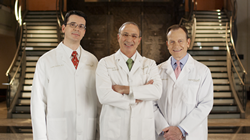
L-to-R: Surgical oncologists Drs. Vadim Gushchin, Armando Sardi, and Kurtis Campbell of Mercy Medical Center, Baltimore, MD
“By way of example, the Chicago Consensus found that the national average for annual number of CRS with HIPEC cases performed by surgeons was 12 – at Mercy, we average 70 per year.” — Armando Sardi, M.D., FACS
BALTIMORE (PRWEB)
January 15, 2021
Drs. Armando Sardi, Vadim Gushchin, and Kurtis Campbell of the Surgical Oncology Department at Mercy Medical Center are widely regarded for their training and skills in utilizing hyperthermic intraperitoneal chemotherapy (HIPEC) to treat advanced stages of abdominal cancer (peritoneal surface malignancies). New findings by a prestigious organization of clinicians adds to this reputation, placing Mercy’s program among the nation’s best.
According to recent findings by the Chicago Consensus Working Group – an assembly of multidisciplinary clinical providers brought together by the Society of Surgical Oncology to fill the gap in guidelines and provide comprehensive recommendations and standards for the management of peritoneal surface malignancies – Mercy exceeded all standards relative to patient care in cases of CRS (cytoreductive surgery, removal of cancer/tumor), with HIPEC. These categories include the total number of HIPEC consultations and surgeries, ostomy rate with reversal, wound infection rate, and rate of readmissions.
“By way of example, the Chicago Consensus found that the national average for annual number of CRS with HIPEC cases performed by surgeons was 12 – at Mercy, we average 70 per year. At Mercy, HIPEC patient overall length of hospital stay and time spent in the ICU were significantly shorter than the benchmark. Mortality, morbidity, and rate of readmission due to complication were all notably below the average national figures—which is indicative of the skill, experience, and dedication of our team here at Mercy,” said Armando Sardi, M.D., FACS, Medical Director of The Institute for Cancer Care at Mercy and Chief of the Division of Surgical Oncology.
Vadim Gushchin, M.D., FACS, Director of The HIPEC Program at Mercy, attributes the program’s success to “a patient centered approach, mastered through a multidisciplinary team of providers – surgeons, gynecologists, oncologists, pathologists, radiologists, primary care doctors, nurses, dietitians, geneticists, and more, all coming together regularly to discuss cases and develop individual treatment plans to achieve the best possible results for our patients,” he said.
The Surgical Oncology team at Mercy includes three fellowship-trained, board certified CRS/HIPEC surgeons with a combined experience of more than 45 years.
“The Mercy HIPEC program is able to call upon specialty services, like interventional radiology, critical care, and complex endoscopy, for our patients’ benefit. In addition, we work with universities and other outside organizations to advance patient care and research in the treatment of peritoneal malignancies, including pseudomyxoma peritonei (PMP) which typically originates from the appendix,” said Kurtis A. Campbell, M.D., Surgical Oncology at Mercy.
For example, in regards to PMP, the Mercy team collaborates with microbiologists and immunologists at the Uniformed Services, University of Health Sciences,; the University of South Carolina, the University of California at San Diego, and Colorado State University, in addition to clinicians and molecular oncology specialists at INOVA Fairfax Hospital (colorectal cancer, ovarian cancer, and peritoneal mesothelioma) and Tempus Labs, Inc. (PMP and ovarian cancer).
“Notably, at Mercy, we work closely with The Lya Segall Ovarian Cancer Institute and their team of gynecologic oncologists, applying CRS/HIPEC to cases of endometrial cancer, uterine sarcomas, and ovarian cancer,” Dr. Sardi said. “This unique partnership allows us to achieve the best possible surgical outcomes for these complex patients.”
Dr. Sardi and Teresa P. Diaz-Montes, M.D., MPH, FACOG, Mercy gynecologic oncologist and Lya Segall Institute Associate Director, have pioneered research into the use of CRS/HIPEC as a front-line therapy for ovarian cancer. Most recently, Drs. Sardi, Diaz-Montes, and Gushchin were among the authors of a new study “Outcomes for Elderly Ovarian Cancer Patients Treated with Cytoreductive Surgery Plus Hyperthermic Intraperitoneal Chemotherapy (CRS/HIPEC),” published online in Annals of Surgical Oncology.
“The HIPEC program at Mercy is further distinguished by having an active research department to analyze results, advance treatments, and improve outcomes for patients,” Dr. Gushchin noted. Currently, Mercy’s Peritoneal Surface Malignancy Center is involved in 12 open studies and four clinical trials, with more than 50 manuscripts published in major medical journals since 2012, and presentations at five major medical conferences in 2019 alone.
“As the work of the Chicago Consensus Working Group makes clear, Mercy’s HIPEC program is among the nation’s leading centers for the diagnosis and treatment of peritoneal surface malignancies,” Dr. Sardi said.
Founded by the Sisters of Mercy in downtown Baltimore City in 1874, Mercy Medical Center is a Catholic hospital with an national reputation for women’s health. Mercy is home to the acclaimed Weinberg Center for Women’s Health & Medicine, and the $400+ million Mary Catherine Bunting Center. For more information, visit Mercy at http://www.mdmercy.com, MDMercyMedia on FACEBOOK and TWITTER, or call 1-800-M.D.-MERCY.
-30-

